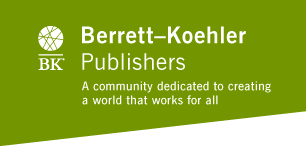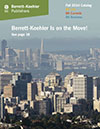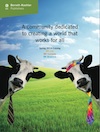On a typical day, we can read that Arctic sea ice is melting far faster than predicted by alarmist computer models, with dramatic impact to come all too soon, and that governments are rushing to exploit newly accessible Arctic resources so as to accelerate the march to destruction. Humans seem to be intent on confirming the argument of biologist Ernst Mayr that higher intelligence may be a lethal mutation. But the grim prognosis is not inevitable. This lucid, informed, and highly constructive study not only outlines where we are heading, but also shows that with “the will to act,” solutions can be found to construct a steady-state economy geared to human needs and to decent survival.
--Noam Chomsky
Dietz and O'Neill understand that an unrelenting message of "doom and gloom" isn't what will save our planet and our people. Instead, they create a remarkable vision of what can work economically, and put this vision in simple terms so that each of us can take steps toward the ultimate goal—a world with ENOUGH prosperity and happiness for everyone, not just for a few. This book will restore your hope in the future and give you specific things you can do to help!
--Thom Hartmann, internationally syndicated talkshow host and author of 24 books
In an age where economic orthodoxy remains all-too fixated on growth, Enough Is Enough offers s a thoughtful contribution to creating an ecologically sound economic system that meets human rather than financial needs.
Gar Alperovitz, professor of political economy at the University of Maryland and author of America Beyond Capitalism
If you think there must be a better way forward than more of the same, then Enough Is Enough is the book for you. It tackles our affluenza, our growth fetish, and our wildly unfair social order head on, and points the way to a better place. I highly recommend it.
--James Gustave Speth, former dean of the Yale School of Forestry and Environmental Studies, cofounder of the Natural Resources Defense Council, and author of America the Possible: Manifesto for a New Economy
The notion that economic growth is the enemy and not our salvation still has about it more than a whiff of heresy. Not after this admirably lucid book, though. Dietz and O’Neill argue persuasively that adopting a governing axiom of “enough” rather than “more” will help make our politics more democratic, our economy more egalitarian and our society more creative… and then they show how to bring it about. How bad is that?
-- Marq de Villiers, journalist and author of thirteen books, including Our Way Out: First Principles for a Post-Apocalyptic Society
This is the book we’ve all been waiting for, as we watch the growth economy collide catastrophically with the constraints of a finite Earth. It’s a clear, informed, practical, honorable and witty guide to where we are, where we need to go, and how to get there. If you are one of so many of us who are bewildered or despairing about the fate of the future, this is the book that will give you an energized sense of purpose and reason-based hope.
--Kathleen Dean Moore, professor of philosophy at Oregon State University, author of The Pine Island Paradox, and coeditor of Moral Ground: Ethical Action for a Planet in Peril
Enough is Enough is a fine addition to a growing literature on how society might change its ways and actually avoid catastrophic collapse. Everyone should read it and become more aware of the scale of the human predicament, the economic insanity that is largely responsible for it, and the desperate need for dramatic change.
--Paul Ehrlich, professor of population studies at Stanford University, President of the Center for Conservation Biology, and coauthor of The Dominant Animal
Saying "Enough!" is heresy in our growth-based economy, in which more, bigger, and faster are the only permissible goals. The authors not only offer specific policy proposals for an economy of sufficiency, but argue persuasively that we could all be happier by exiting the growth treadmill. This is a book that every American should read.
--Richard Heinberg, Senior Fellow of the Post Carbon Institute and author of ten books, including The End of Growth
Enough Is Enough is an extremely important and timely work. Herman Daly and his many colleagues have masterfully articulated the importance of creating a new economy that can enhance rather than destroy our natural resources and, at the same time, improve our quality of life. Now, in Enough is Enough, Rob Dietz and Dan O'Neill have laid out a pragmatic scenario which describes, in great detail, how we can all become involved in making that economy a reality in the communities and on the planet in which we live. This is a must read for anyone interested in their own welfare and that of their children and grandchildren.
--Frederick Kirschenmann, professor of philosophy at Iowa State University, Distinguished Fellow of the Leopold Center, and author of Cultivating an Ecological Conscience
Enough Is Enough provides a preview of the new world we must inevitably enter. Although Dietz and O'Neill pay careful attention to real-world limits to growth, these two visionaries show us how we can lead happy lives by embracing an economy of enough.
--Richard Lamm, three-term governor of Colorado
In Enough Is Enough, Dietz and O'Neill have accomplished something special. They offer a hopeful and practical plan for righting the economic and environmental ship, and they do it in a very engaging way. I hope my colleagues in parliament are paying close attention to the ideas in this book—I know I am.
-- Caroline Lucas, member of UK Parliament for Brighton Pavilion and former leader of the Green Party of England and Wales
Walking in the steps of E. F. Schumacher, Ivan Illich, Thich Nhat Hanh and of course the great religions, perhaps best represented by the Taoists and Buddhists for their ethics of simplicity and not grasping always for more, Rob Dietz and Dan O’Neill bring the modern dilemma of growth and the dogma of “more is better” into the contemporary reality. Enough Is Enough offers important new thinking on how to address the planet’s most urgent crises and establish an economy that achieves true biological sustainability and shared wealth for all.
--Doug Tompkins, founder of The North Face, cofounder of Esprit, and President of the Conservation Land Trust
In the 6th century BCE Lao Tzu wisely wrote that the person who knows that enough is enough will always have enough. It has taken us 26 centuries of apparent progress to forget that, and it is high time to relearn it. Rob Dietz and Dan O'Neill provide a compelling case for us to do just that. As well as an accessible guide to the growth-and-greed economy they offer a series of simple and achievable steps to replacing it with something sustainable and infinitely more satisfying.
--Molly Scott Cato, professor of strategy and sustainability at Roehampton University and author of Environment and Economy
What scope is there for moving beyond today's increasingly desperate pursuit of conventional economic growth? For politicians to carve out some real space in that territory, they need to immerse themselves in the "beyond growth" debate, and there is no better way of doing that than familiarizing themselves with the ideas and insights in Enough is Enough.
--Jonathon Porritt, founder and director of the Forum for the Future and author of Capitalism as if the World Matters
Two qualities that allegedly distinguish humans from other species are high intelligence (the ability to reason logically from the evidence) and the capacity for forward planning (the ability to design a better future). At no time in history has there been greater need for these qualities or less evidence of their existence—the global human enterprise is on a trajectory toward social and ecological collapse. But clear-thinking, forward-looking people can take heart. With Enough Is Enough, Rob Dietz and Dan O’Neill have provided both the unassailable rationale and the visionary plan the world needs to live well, more equitably and sustainably within the means of nature.
--William Rees, professor of public policy and ecological economics at the University of British Columbia and originator of ecological footprint analysis.
With their new book, Enough Is Enough, Rob Dietz and Dan O'Neill let you have your facts and read it too. Building on the work of Herman Daly, Tim Jackson, Peter Victor and others, they've written the most accessible and well-argued case for a steady-state, no growth economy I've had the opportunity to read. With stories, examples and plenty of data, but without the tedium of academic writing, Dietz and O'Neill take aim at the most persistent of the economic myths of both Right and Left—that economies must grow without limits to provide full employment and improve the conditions of the poor. They show clearly how a different model for wealthy societies, based on sharing work and focused on non-material sources of happiness, is not only possible but desirable, and is the only way to allow the poor countries of the world to expand their own economies without irreversible damage to the life-support systems of our planet. I can't recommend a book more highly.
--John de Graaf, coauthor of Affluenza and What’s the Economy for, Anyway?
Rob Dietz and Dan O’Neill are leaders in the new generation of thinkers and doers on the steady-state economy. In Enough Is Enough they present a compelling case for why ‘enough’ should replace ‘more’ as the goal of a successful economy, and they provide information, arguments and examples to show how our lives would be much improved by such a fundamental change.
--Peter Victor, professor of environmental studies at York University and author of Managing without Growth
This wonderful book focuses on the heart of the matter: our world is being destroyed because, as a society and an economy, we have become oblivious to limits of every kind. Limits of resources on a finite earth, limits of planetary carrying capacity, and most of all limits to human material aspirations. The last point is the most poignant and profound. How did we get this way? How could we be so dumb? So limited in our perceptions? How can we not understand that you can’t consume everything, the corpus of life, and live? Or that material acquisition, a trivial pursuit, cannot bring happiness? This book is a great primer for systematically unpeeling the dominant insanity of our time, and then waking up and doing something to change it. It should be required reading for every high school and college class devoted to the economics of sanity. And every government official as well.
Jerry Mander, author of Four Arguments for the Elimination of Television, In the Absence of the Sacred, and The Capitalism Papers
Rob Dietz and Dan O’Neill bring clarity and style to their impassioned and meticulous analysis—showing up the impossible logic of a continued desire for economic growth. Their vision of a steady-state economy, and their practical focus on how we achieve it, is a significant roadmap, offering the way to a better quality of life and sustainable future for all of us and the planet.
--Kate Pickett, professor of Epidemiology, University of York, coauthor of The Spirit Level, and cofounder of The Equality Trust
We need a world where sustainable human well-being is the primary goal, not the insane delusion of infinite growth. In Enough Is Enough, Rob Dietz and Dan O'Neill tell us how to get there. It is the most readable description of the fundamental problems with the "growth at all costs" economic paradigm and how focusing on "enough" material consumption can make room for all the other things that contribute to human well-being. If you've had enough of the crazy economics of growth for the 1%, at the expense of well-being for the 99% and the planet, then this is the book for you.
--Robert Costanza, professor of sustainability, Portland State University and chief editor of Solutions magazine
Enough Is Enough should be required reading for every economics student as an antidote to the wacky assumptions of the field that a planet with finite resources can support infinite growth. Rob Dietz and Dan O’Neill show the importance of growing, not obsolete economic indicators like GDP, but long-neglected human capacities for creativity and compassion. Like shooting fish in a barrel, they offer practical (if provocative) strategies for making energy use renewable, stabilizing the world’s population, distributing wealth more fairly, and revamping business and national job policies. Whether or not you agree with all their proposals, this highly readable and provocative book will profoundly expand your thinking about what’s possible.
--Michael Shuman, Fellow of the Business Alliance for Local Living Economies and author of Local Dollars, Local Sense and The Small-Mart Revolution
 0 items in cart
0 items in cart









